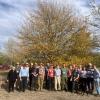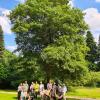Editor's Picks
Plant Focus
Presentation given at the XX International Botanical Conference, Madrid, Spain, July 21–27, 2024.
Authors:
Rosina Magaña Ugarte1, Francisco I. Pugnaire2
Affiliations:
1. Department of Pharmacology, Pharmacognosy and Botany, Faculty of Pharmacy, Universidad Complutense de Madrid, Madrid, Spain.
2. Estación Experimental de Zonas Áridas, CSIC, Almería, Spain.
Abstract:
Germination onset is the first choice in the phenological plant cycle, influenced by abiotic and biotic factors. Both soil and seed microbiota are key drivers of germination, influencing seed storage, dormancy release, and germination rates. Interactions between plants and soil microbes contribute to plant adaptation to their environment. Therefore, plants could benefit more from interacting with soil microbes from the local (‘home’) environment rather than with those from different origins. As crucial germination drivers, plants may select for specific microbial taxa that provide them with a home-field advantage, despite having less microbial richness and diversity. Here, we look at the role of seed-associated microbes on holm oak (Quercus ilex) germination, whether the soil or the seed microbes have a greater impact on this process, and how the interaction between the seed microbiome and soil microbiota influence holm oak germination. We found that microbes on Q. ilex seeds have a significant effect on germination, with non-sterilised seeds having higher germination rates than sterilised ones. Moreover, when co-occurring, soil microorganisms enhance the effect of seed-associated microbes on holm oak germination. Overall, our results evidence a home-field advantage where local soil communities, along with seed-associated microorganisms, enhance Q. ilex germination over that of different soil or species-linked communities.















